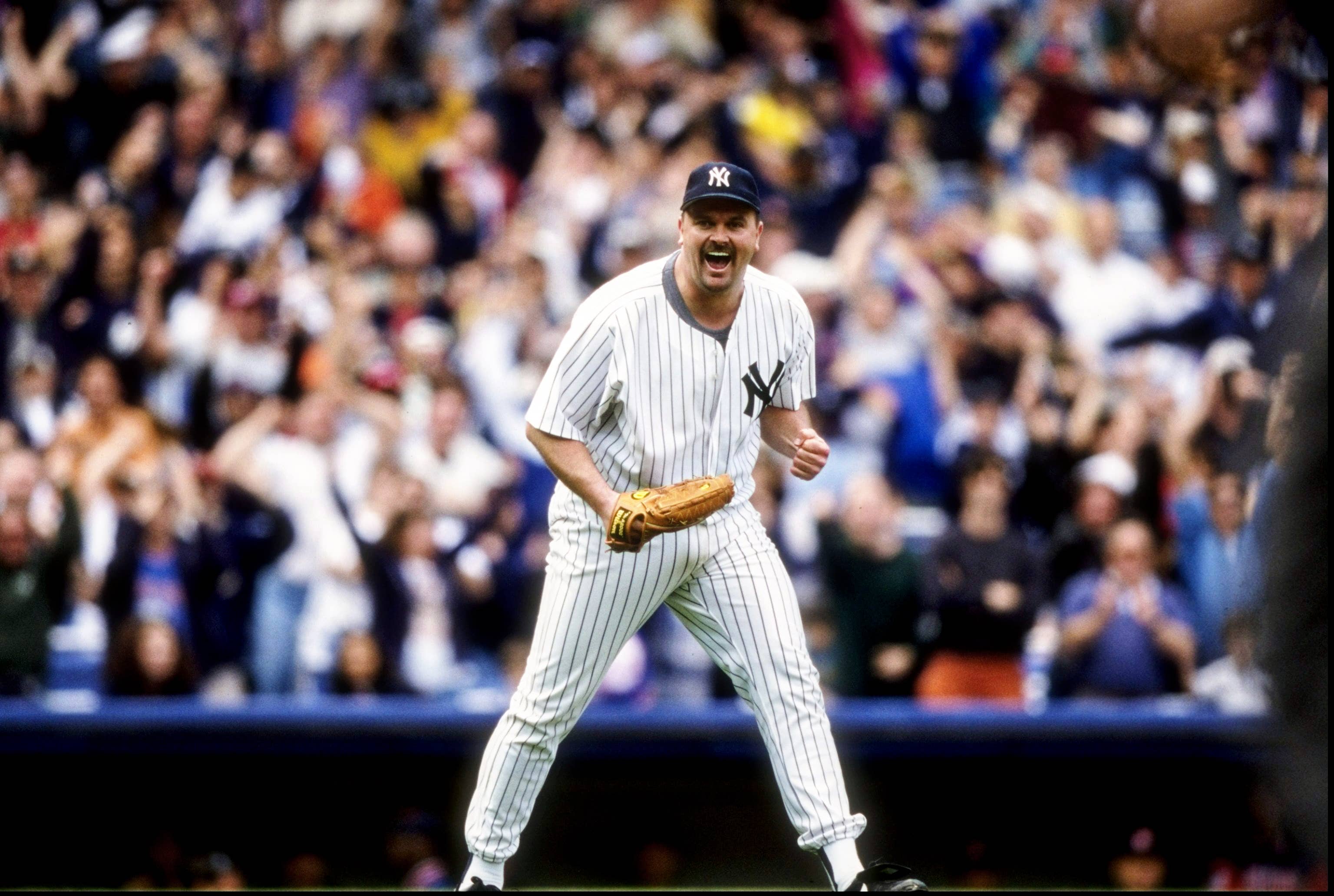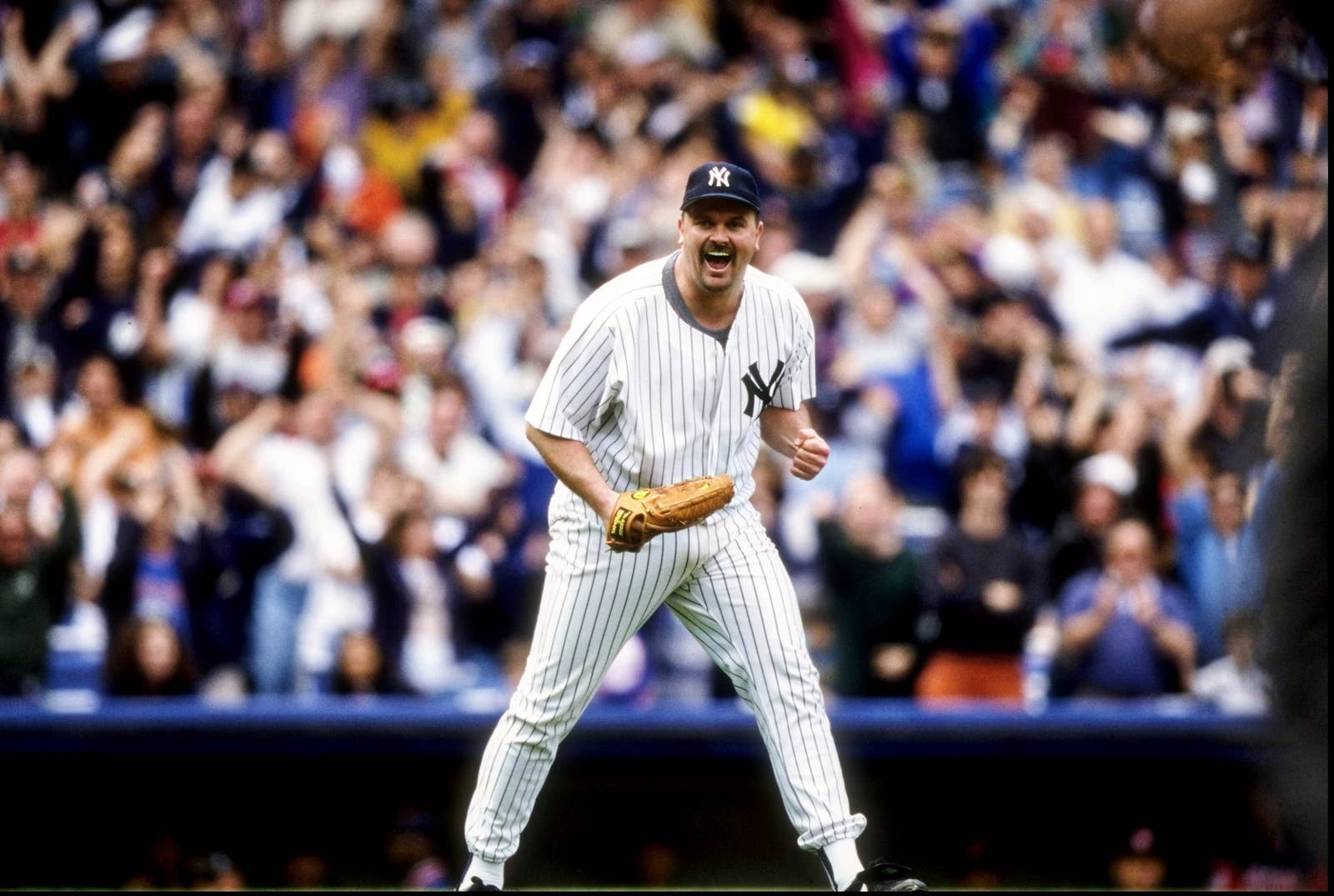
For all the New York Yankees’ storied and glorious history, before 1998 the franchise could claim just one perfect game: Don Larsen’s wildly improbable performance against the Brooklyn Dodgers in the 1956 World Series. That was until David Wells in 1998, a most imperfect Yankee in what would become the Yankees’ greatest season.
But the '98 Yankees, who would win 114 regular season games and only lose twice in the postseason, didn't start so hot. Dropping four of their first five games, their sole victory required extra innings. Naturally—because, you know, New York and George Steinbrenner—people began to wonder if manager Joe Torre was another loss or two from losing his job, much as Yogi Berra had been fired after just 16 games back in 1985.
This time Steinbrenner didn’t panic, and all the Yankees did was win eight in a row, 14 of 15, and 22 of 24. By the time May 17 rolled around, the Yankees were an incredible 27-9, with David Wells, just a few days short of his 35th birthday, slated to start their Sunday matinee against the Minnesota Twins. Wells, known for his rubber arm, love of a good party, and unique physique, entered his start with a 4-1 record, but also a 5.23 ERA, largely because he’d given up 10 home runs in just 52 innings.
Before and since Larsen’s perfect game, the Yankees boasted innumerable winning seasons and staffs full of supremely talented pitchers. But nobody else had matched Larsen…until May 17, when the hungover and sleep-deprived Wells retired all 27 Twins he faced in the game that perhaps best epitomized the Yankees’ record-breaking season. Here, Wells, along with teammates and opponents, talks about a bleary-eyed lefty putting together one of the greatest games in franchise history.
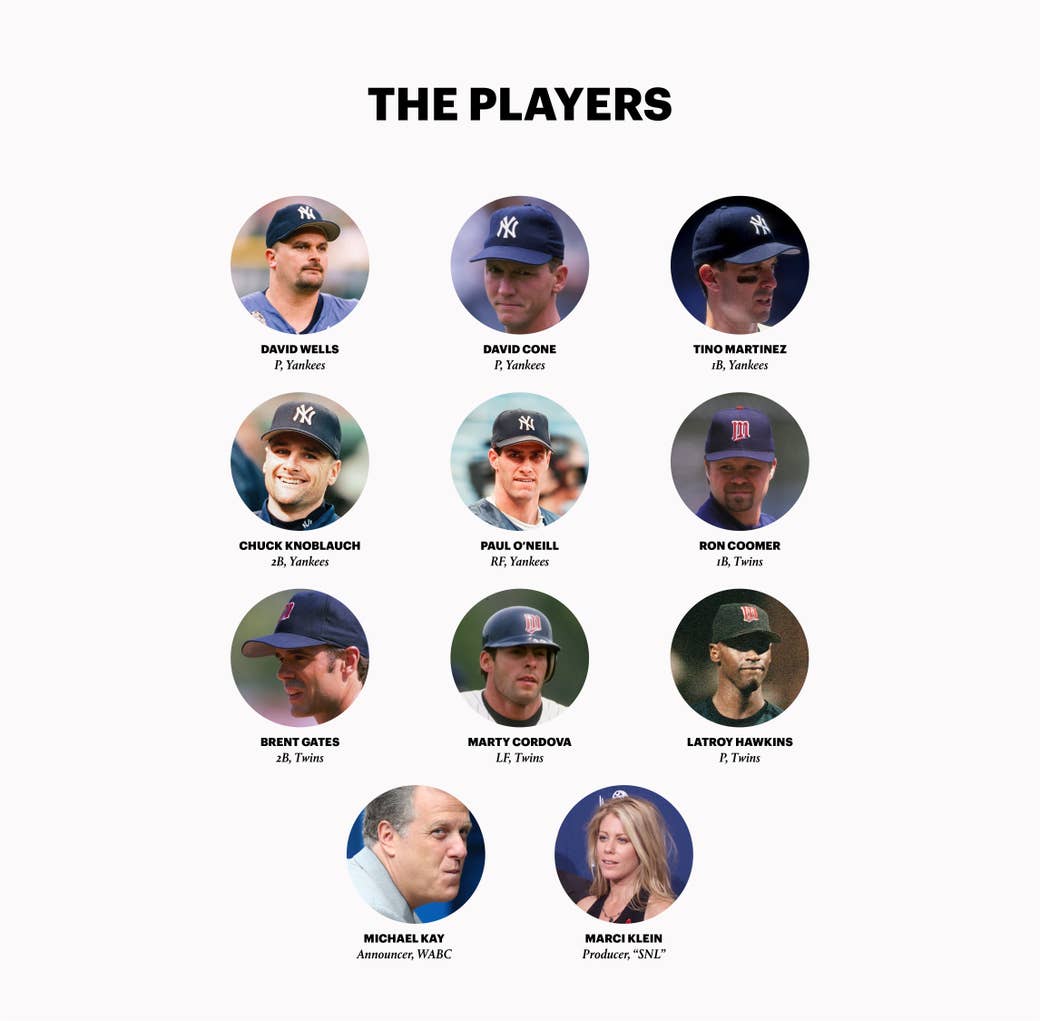
Michael Kay, Yankees radio announcer: By then, it seemed like they won every single day. They just had a way about them, not a cocky thing, but just that they expected to win every game and got a little mad when they didn’t. And the perfect game just fit right into the narrative.
David Wells, Yankees pitcher: I always challenged guys—just go get ‘em, try not to walk people. Maybe I’d give up a few runs, but we had such a good team we’d just outscore ‘em.
David Cone, Yankees pitcher: Everybody loved the days he pitched because the game went so fast. He wasn’t out there walking people, which made it much easier for the guys in the field behind him. His curveball was one of the very best, and when he could control the corners with his fastball it made his curve that much better. I think he has the purest mechanics I’ve ever seen, with his over-the-head windup. He’s fearless on the mound. If anything, he throws too many strikes; he has no patience for balls, and barely walked anybody. Sometimes I’d tell him he had to throw a ball to keep them off balance, but he thought it was a waste of time.
There are, um, stories about David Wells the night before—well, really the morning before—he started against the Twins. That should hardly be a surprise, considering Wells’ reputation as a serious partier, which followed him through his long career and many travels.
Marty Cordova, Twins outfielder: The rumor is he was out all night before. Where was it supposed to be? Solid Gold Strip Club? I love that it got out. It’s perfect for him. If he was hungover and miserable, you couldn’t tell.
Chuck Knoblauch, Yankees second baseman: I heard those stories years later about Wells being hungover. I can’t say for sure, but it definitely wouldn’t surprise me. Him being out with cast members from Saturday Night Live the night before? That wouldn’t be out of the question. He had a good time.
Cone: I knew before the game he was dragging. It was Beanie Baby day. Beanie Babies were so big back then that even us players were scrambling trying to get extras. So we’re all kind of distracted with the Beanie Baby thing and then I see Wells walk in before the game and he just shot me a look and went straight to the coffee. I knew he was hurting; that’s absolutely true. As far as the infamous after-party the night before, I believe it. He’d become close friends with Lorne Michaels. I’ve been to a few of those. They don’t really start until 1 or 2 in the morning, when the show ends.
Wells: I was leaving the SNL show the night before, and Marci Klein’s like, “Hey, why don’t you come to the after-party?” And I said, “Not this time. I’m pitching tomorrow.” And she goes, “You have to come. You know, Dennis Rodman came once, and the next day was one of the best games of his career, 23 or 25 rebounds or something.” I can’t say she called me a pussy, but I can’t say she didn’t. So I went, and I look around and there’s Jimmy Fallon and Will Forte and probably Fred Armisen, and one thing just led to another.
Marci Klein, Saturday Night Live producer: He was there all the time, but I remember him being there specifically that night, because the next day he threw the no-hitter. There were a few guys who came around a lot—Tino Martinez and David Cone, especially—but David was the ringleader. I remember giving David a hand massage. Not a hand job; a hand massage. He said, “You know, I’m pitching tomorrow.” So I said, “Well, let me massage your hand.”
"I remember looking in the dugout, and seeing David Cone hunched down, sorta hiding in his jacket with his sunglasses on. Then I get back in the dugout and he called Me a pussy."
Yes, SNL’s after-parties were famous for going until dawn. But there just one thing: There wasn’t an SNL after-party the morning before Wells’ start on the 17th, because Season 23 had wrapped on the 9th.
Klein: I definitely remember telling him, “I can’t fucking believe you pitched a no-hitter after I gave you a hand massage.” I remember that moment in my life. I remember being with him. But there’s no other party. There’s not a party a week after the season ends. Could I have invited him out for drinks or something? Could a group of us from the show have gotten together that night, and David was there? I don’t know how to explain it.
Wells: I think I got home at 5:30, probably got two-and-a-half hours of sleep.I knew this was not good, so I just tried to stay away from everybody, was worried someone might get high off the fumes. I had consumed a lot of alcohol. I was a dummy, but I just got caught up in the moment. You can thank Marci Klein for that. I had a job to do, so I went out there and did it. I was the one who put myself in that predicament. Before the game, my bullpen was horrific, just threw two balls out of the stadium because I was so frustrated. I could not throw a curveball, and got to the point where I just quit throwing—I said, “That’s it.”
Brent Gates, Twins second baseman: The first thing that comes to mind is it was Beanie Baby Day. I wouldn’t remember that except Yankee Stadium was packed with like 60,000 people and it was buzzing like a New York crowd. The atmosphere was great.
Wells: A lot of times when I had good bullpens, I’d feel invincible and try to be too fine, and then don’t last two innings. When you get out there and you’re too fine, a lot of things can go wrong.
Ron Coomer, Twins first baseman: David was a real good starting pitcher, maybe their third or fourth starter. He threw the ball well, knew how to pitch. My forte was hitting left-handed pitchers, and I’d done pretty well against him. Generally the Yankees pitched me inside, and David came inside with the hard stuff. He had the good live fastball, then the big looping curveball.
Wells: I was old-fashioned. I pitched to my strengths, not the hitter’s strengths. I trusted my ability, my pitch selection, basically worked off what I did well. Still had good velocity, low- to mid-90s, and the curveball, also the changeup and cutter. I had a few pitches, and I utilized ‘em. That day, every one of ‘em was working.
Gates: By the fourth or fifth inning we all knew he had a perfect game. It wasn’t just that we hadn’t had any base runners; there were no hard-hit balls. That was when I started to realize we have got to get a hit here.
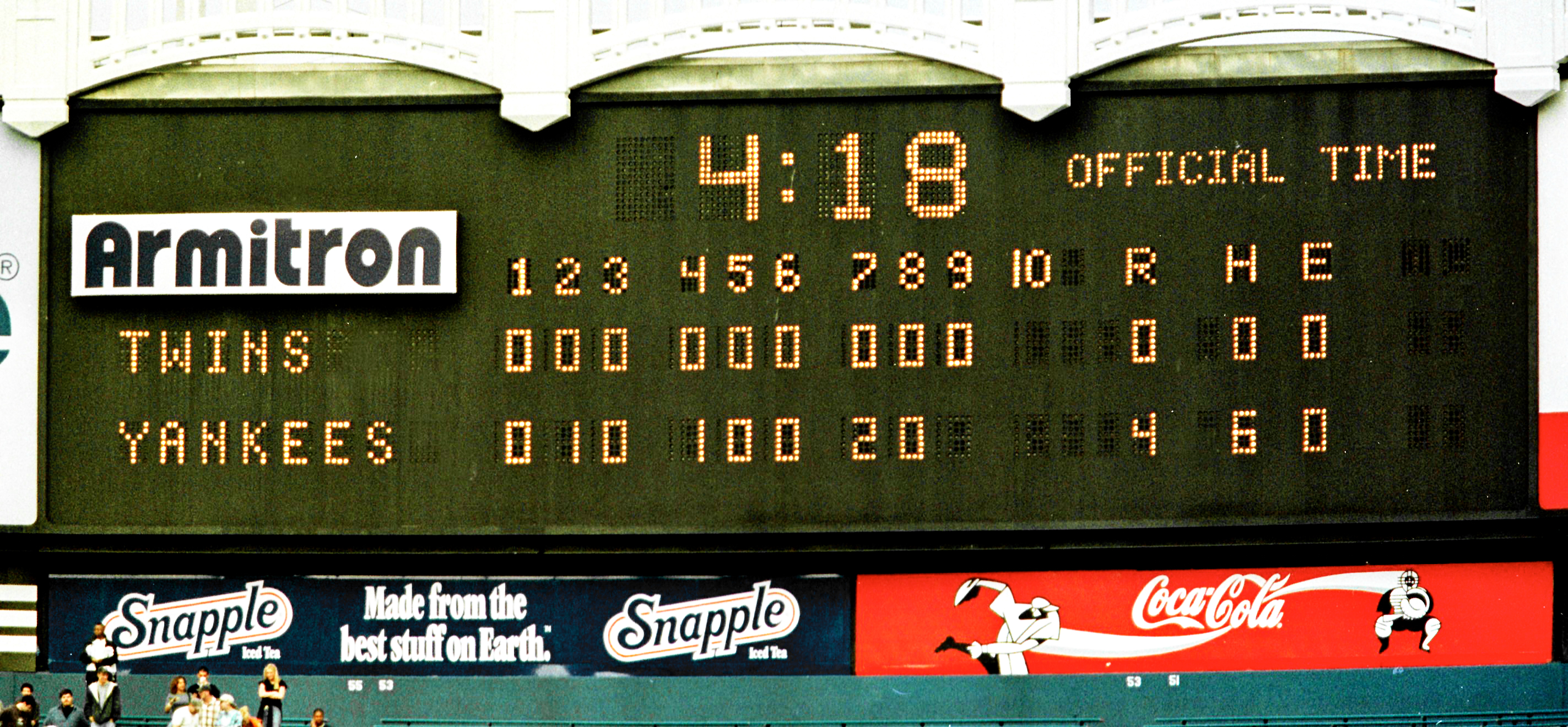
The Twins’ starting pitcher was LaTroy Hawkins, who would eventually become a relief pitcher and remain in the major leagues through 2015, when he was 42. Hawkins entered the game with a 5.28 ERA for the season, 6.40 in his young career. But he turned in six fine innings against the powerful Yankees, giving up just three hits and two runs before stumbling a bit in the seventh.
LaTroy Hawkins, Twins pitcher: I came in, after the fifth I think, and was sitting next to Bob Tewksbury and said, “Damn, he’s throwing a no-hitter.” And Tewksbury said, “No, he’s throwing a perfect game.” I remember Tim McClelland had a big strike zone.
Knoblauch: As the game went on and the crowd got louder with each out, you become aware of what’s going on around you. But I think I became aware in the fifth inning. The sixth guy in the order had come up the second time and it was already late in the game. I started doing the math and I realized, Oh my God—nobody’s gotten on base yet.
Kay: I’ve always been of the opinion that you say what’s going on, and don’t get cute. If it’s good enough for Vin Scully, it’s good enough for me. In the fifth inning, we said that Wells hasn’t given up a hit or walk so far. In the sixth, we said if you’ve got a friend who’s a baseball fan, you might want to have them turn on their radio or TV. Of course, now if you say anything and then the guy gives up a hit, you’ll get a bunch of nasty, vitriolic tweets: It’s your fault! Which is laughable.
Wells: I was very superstitious—how I walked back to the dugout between innings, always sitting on the first step in the dugout, getting a drink after the second out. I knew I had it going on in the fourth or fifth inning, when I heard Sterling and Kay on the radio saying I had a perfect game, and I just went, [sings] "La la la la la la la."
Tino Martinez, Yankees first baseman: When a guy has a no-hitter or a perfect game going on, you don't talk to the guy in the dugout. He knew what was going on. We all knew what was going on. So we tried to stay away from him. And he's going, “Come on, guys. Talk to me!” He said it, blurted it out loud, which was kind of funny. He didn't care about the jinx. So David Cone said, “All right, we have a good game going on.”
Cone: I think it was the sixth or seventh inning when I told him he should try throwing a knuckleball. I knew him well enough to know that he needed something to maybe lighten the tension. It was getting hairy out there. He was a nervous Nellie, and I wanted to help take the pressure off, so I thought I’d say something. I’m glad he finished [the perfect game] because I probably would’ve gotten the blame if he hadn’t.
Wells: I remember looking in the dugout, and seeing David Cone hunched down, sorta hiding in his jacket with his sunglasses on. That kinda cracked me up. Then I get back in the dugout and he called me a pussy: "You got nothin’. You’re a pussy if you don’t show ‘em a knuckleball." And I said, “Man, I don’t have a knuckleball.” And he just said, "You got nothin’ out there." And him doing that really helped keep me loose.
Hawkins: I kinda found myself rooting for him just a little. I think Paul Molitor hit one off Knoblauch’s chest, but it just bounced a few feet away and he threw him out. When you start seeing stuff like that, you think maybe this is just supposed to happen.
"I will never give anything to the Hall of fame. Cal Ripken told me that. Once you give the Hall of Fame something, it's theirs forever. Loan 'em stuff, but that's it."
Coomer: Molly hit a couple balls pretty good, Marty Cordova hit one pretty good. In the eighth, I hit a bullet right off Knoblauch; hit him in the chest but he recovered and threw me out. That was probably our best chance of getting a base hit.
Knoblauch: I played with Coomer in Minnesota. He absolutely killed lefties. It didn’t surprise me at all that he was DHing that day against Wells and that he had great numbers against him. He hit the ball hard. It was a line drive that took a long hop on me, with topspin. I don’t think it caught on grass. I remember crossing over with my right foot and then turning and throwing. That was before my throwing problems, or whatever you want to call them. [Like another former Yankees second baseman, Steve Sax,Knoblauch would later develop the yips, an inability to throw the ball to first base.] I threw a strike. At the time it was a typical throw for me, but it was still nerve-wracking. But at the same time you can’t be standing there thinking, Don’t hit the ball to me, because then the ball will get hit right at you.
Wells: Yeah, Coomer to Knoblauch. I thought it hit Chuck in the chest. With him, you didn’t know what you were going to get—you know, with the Steve Sax Disease—but he picked it up and threw a strike to Tino. Good thing it was Coomer, who was not a fast runner.
Entering the ninth, Wells still hadn’t given up a baserunner. With the Yankees scoring twice in the seventh, he had a comfortable 4-0 lead to protect. With 24 up and 24 down, the bottom of the Twins’ order was due up: third baseman Jon Shave, catcher Javier Valentin and shortstop Pat Meares. Shave fouled off three pitches, but finally popped out to short right field. Valentin struck out swinging—the 11th strikeout of the game for Wells. That left only Meares, a .268 career hitter, between Wells and immortality.
Hawkins: I was back in the dugout in the ninth. I couldn’t cheer for him, but it was pretty cool to see it.
Knoblauch: There was something so special about that team. I think everyone out on that field wanted the ball hit to them. We all wanted to be a part of it. We all wanted to be the one to make that last out. I’ve seen that blooper down the line to O’Neill a thousand times.
Paul O’Neill, Yankees right fielder: The ball Pat Meares hit to me to end it was exactly what you want. What you don’t want is a sinking liner or a fly ball in the sun or something. But this was a huge relief, a very easy fly ball that you’ll catch 100 times out of 100 times.
Wells: When he hit it, I thought it was a foul ball. But then I saw O’Neill jogging over and I thought, Holy shit, this is gonna happen.
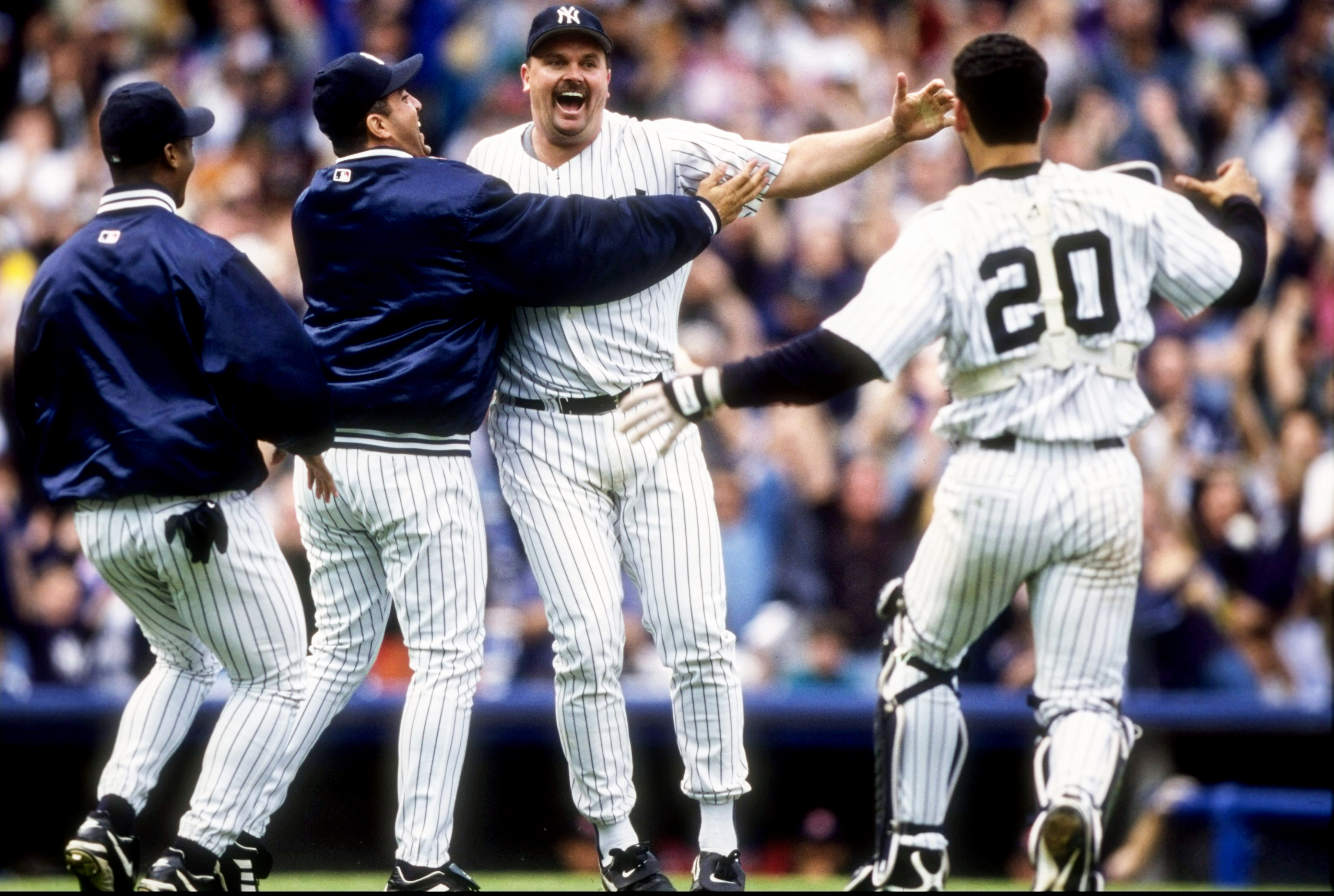
In 1998, Kay was in his seventh season as John Sterling’s partner on the Yankees’ radio broadcasts. Jim Abbott had thrown a no-hitter for the Yankees in 1993, followed by Dwight Gooden in 1996; in both games, the senior Sterling had called the ninth inning. He would do the same this time...
Kay: John had the ninth inning, but we never really planned anything. At nut-cutting time, John’s one of the best. But in ’93, when Abbott threw his no-hitter, after the last out, John just put his hand up and all you heard on the broadcast was the crowd noise. This is radio, and he took some heat for that. So for Gooden’s no-hitter, as we got toward the end, off the air I said, “John, you gotta say something, and then I’ll talk about what’s happening on the field.” And that’s how we handled Wells. He said Twenty-seven up, twenty-seven down, baseball immortality for David Wells, and then I just described what was going on.
O’Neill: I remember running in and thinking about everything, and by the time I got to Wells, I jokingly told him that I’d tossed the ball into the stands. Then I handed him the ball and told him congratulations. That was just a fun time to be a part of the team.
Knoblauch: I still get chills thinking about it. When it happened, it was a blur. I was so happy for him. I know from replays and pictures I was going nuts like a crazy person. I think it was Strawberry who picked his big ass up and carried him off. There’s a famous shot of that, and I’m off standing just to the right going nuts.
Cone: It was incredible because he was in shock. He was carried off the field and just sat down on the bench, stunned. I grabbed him and told him to look at the scoreboard. I told him to remember the view and enjoy the moment. We still talk about that. It snapped him out of it.
Wells: Getting carried off the field was a cool gesture from my teammates. Eventually it was just me and David in the dugout. I went out for a curtain call, came back and sat next to David, and he goes, “Look at that scoreboard. You’ll never see that shit again.” He was right. The next year, he pitched a perfect game and saw it again. But by then I was gone.
Gates: The funniest part is when we came into the clubhouse, the grounds crew was sitting right there with the pitching rubber they had just pulled out of the ground. Wells wanted all nine guys in the [Twins] lineup that day to sign it! It was like pouring salt in the wound. But we did it. I don’t think anybody said no.
Cordova: I played with him later in Toronto. We never really talked about that game, except he did tell me he got to keep the rubber from the mound that day and all the Twins signed it.
Wells: I just looked at the rubber yesterday; I had some friends here and was showing them the trophy room. I didn’t know anything about [the Twins signing the rubber] until they sent it to me later. Somebody with the Yankees got all the Twins to sign it, except Jon Shave. I don’t know if he’d already left the clubhouse or what. But somebody got it signed by everybody else, and they had it painted. None of my teammates signed it, though. I wish they had, especially Hideki Irabu. You know, since he’s gone now.
I’ve got the rubber, I have the game ball, the one O’Neill gave me. I kept the hat, the jersey, the pants, basically everything. The glove’s at Yankee Stadium right now, in a display they’ve got. I got all the balls from the game; I took all of those. I will never give a thing to the Hall of Fame. Cal Ripken told me that: Once you give the Hall of Fame something, it’s theirs forever. Loan ‘em stuff, but that’s it.
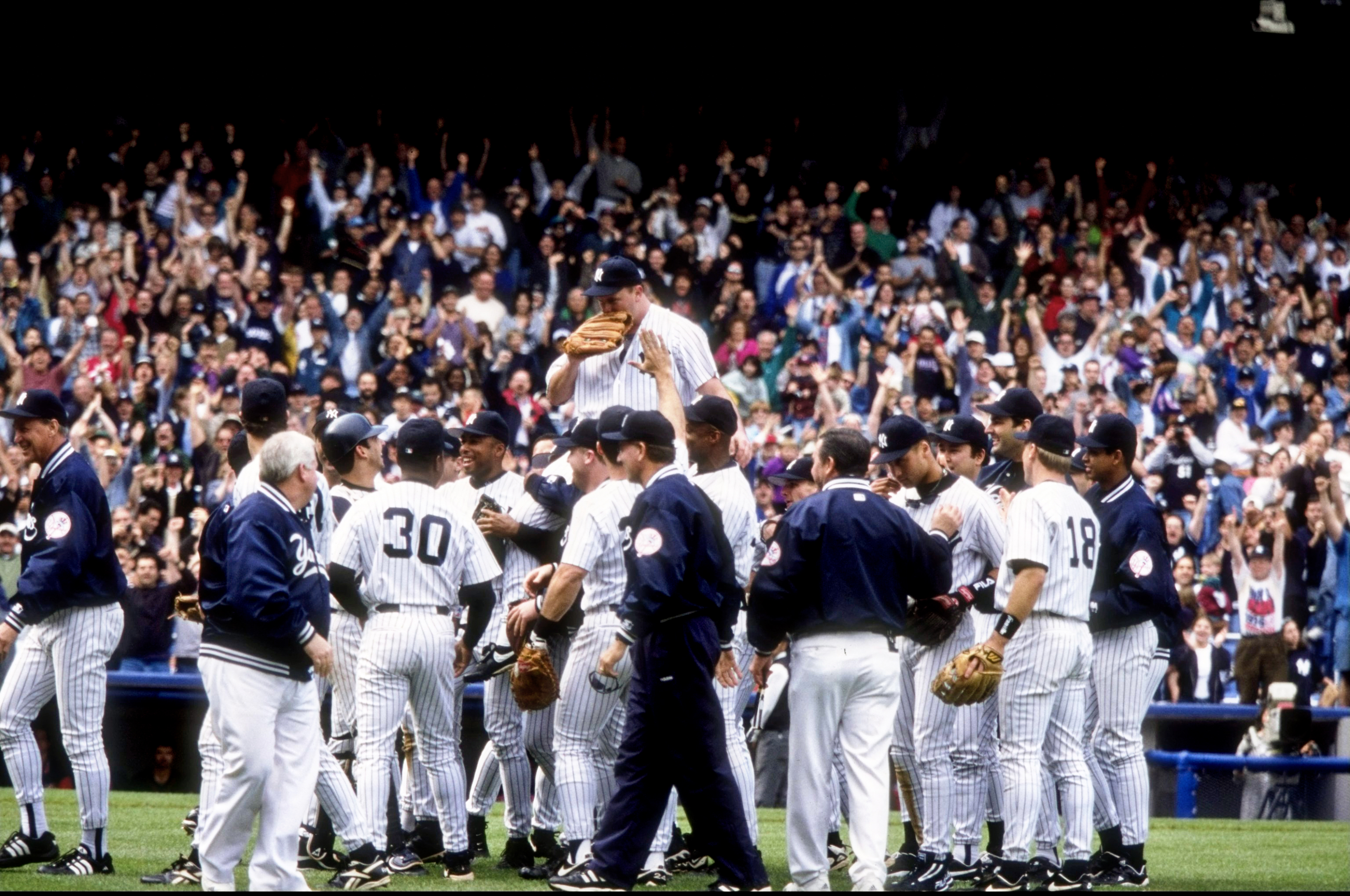
After his perfect game, Wells went 17-4 with a 3.10 ERA the rest of the regular season. He was even better in the postseason, going 4-0 as the Yankees steamrolled the Rangers, Indians and Padres on their way to their first of three straight championships.
O’Neill: A lot of pitchers don’t recover from something like that, at least for the next few starts. But from then on, I thought he was probably the best pitcher in baseball all the way through the World Series. It seemed like that game was a confidence booster, and he just got better and better.
Cone: He had everything working that day. After he threw the perfect game his confidence grew by leaps and bounds. He and Joe Torre had kind of butted heads up to that point, but from that point on [Torre] kind of left him alone. I told Joe to just let me have him. I got him.
Kay: I was one of the few in the media that liked him. But I’ve always said that with his rubber arm and his stuff, if he’d taken pitching as seriously as Roger Clemens, he could have been one of the all-time greats. He just didn’t have that doggedness Clemens had. Two or three months later, Wells almost pitched another perfect game, against the A’s; [Jason] Giambi broke it up with a hit in the seventh. And I remember this so clearly—after the game Wells said, “That was a relief. I just wanted to give up a hit, and still win the game. You know, the perfect game took up so much of my time, was such a distraction.”
Wells: Yeah, I said that. I’m glad it never happened again. It’s overwhelming, to be honest, when you’re going through it. In New York, especially. There are just a lot of things, all the compliments and the gifts. I wasn’t really big with the media, wasn’t a big fan of ‘em. Being in a big market, it was just a lot of stuff. Everybody wants a piece of you.
** Additional reporting from Molly Knight. **

